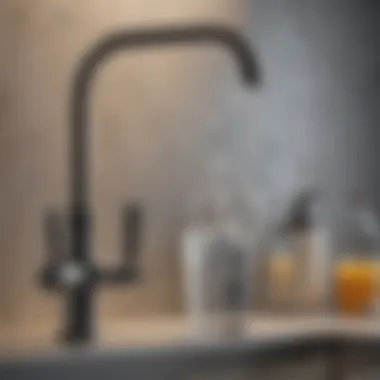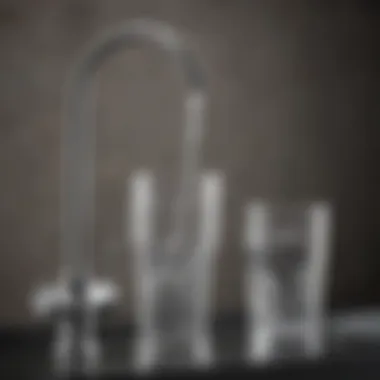Top Faucet Water Filters for Hard Water Issues


Intro
Access to clean and safe drinking water is vital for health and well-being. However, for many, hard water presents a significant challenge. Hard water contains high levels of minerals, primarily calcium and magnesium, which can lead to various problems. These include scaling on plumbing fixtures, reduced soap efficiency, and even a negative impact on taste. This guide aims to provide insight into the best faucet water filters specifically tailored to combat the issues related to hard water.
Understanding the right filtration systems can make a considerable difference in water quality. With numerous products available, and varying features across the market, knowing what works best for hard water is essential. This article will comprehensively examine the causes and effects of hard water, the technologies and features that improve filtration, and evaluate top products based on performance. Furthermore, it will provide practical tips on installation and maintenance, ensuring readers are well-prepared to choose the ideal water filter for their needs.
Understanding Hard Water
Understanding hard water is a crucial aspect to comprehend when choosing the best faucet water filter. Hard water contains a high concentration of minerals, particularly calcium and magnesium. This mineral composition is important as it affects not only the quality of the water consumed but also the functionality of household appliances relying on water. Furthermore, recognizing how hard water forms can aid in selecting effective filtration systems that address its specific challenges.
Definition and Composition of Hard Water
Hard water is defined by its elevated levels of calcium and magnesium ions. These minerals are naturally occurring and enter the water supply through soil and rock. Generally, water is categorized as hard when it contains more than 60 mg/L of combined calcium and magnesium.
Key components of hard water:
- Calcium: Contributes to scale buildup in pipes and appliances.
- Magnesium: Impacts soap and detergent efficiency, leading to scum formation.
The combination of these elements alters the water's overall characteristics, making it less suitable for various applications without treatment.
Causes of Hard Water
The causes of hard water can be traced back to several natural and environmental factors. The primary contributors include geology and human activity:
- Geological Influences: Water dissolves minerals from rocks, particularly limestone and chalk, as it travels through the ground.
- Groundwater Sources: Wells and aquifers often have higher mineral content than surface water sources.
- Urban Runoff: In certain regions, urban runoff can introduce additional minerals into the water supply, which can increase hardness levels.
Awareness of these causes can lead to better management and treatment of hard water and inform the selection of effective filtration options.
Effects of Hard Water on Health and Household
While hard water is not considered a health risk, it does affect health indirectly through its impact on household systems. Here are some notable effects:
- Scale Buildup: Hard water can cause scaling in pipes, water heaters, and appliances. This can lead to reduced efficiency and increased energy costs.
- Skin and Hair Condition: Hard water can result in dry skin and hair. It can make rinsing more difficult, as soap does not lather well, leading to residue.
- Taste and Acceptance: Drinking hard water may lead to a chalky taste, which can deter consumption.
- Impact on Cooking: Hard water can alter the taste and quality of food and beverages prepared with it, particularly in culinary contexts where water flavor is crucial.
Understanding the implications of hard water is essential for making informed choices about filtration and treatment options.
Faucet Water Filters: Basics
Faucet water filters play a crucial role in enhancing the quality of drinking water, especially in the context of hard water. Understanding the fundamentals of these filtration systems is essential for making informed purchasing decisions. They not only help in improving water taste and safety but also offer a practical solution to the issues brought on by hard water. This section outlines the basic aspects, types, and key features that are relevant to faucet water filters.
What is a Faucet Water Filter?
A faucet water filter is a device that attaches directly to the end of a kitchen or bathroom faucet. Its primary function is to purify tap water, removing impurities that may be harmful or affect the water's taste. This device can significantly reduce the levels of contaminants typically found in hard water, such as calcium and magnesium, which are responsible for the unpleasant taste and potential health impacts. By filtering the water as it flows through the faucet, users can enjoy cleaner and better tasting water without needing a full-scale water purification system.
Types of Faucet Water Filters
Different faucet water filters utilize various technologies to tackle the issues associated with hard water. Understanding the types will help consumers select the most appropriate one based on their needs.
Activated Carbon Filters
Activated carbon filters are effective at removing chlorine, sediment, and volatile organic compounds (VOCs) from water. The key characteristic of these filters is their large surface area, which provides numerous adsorption sites for contaminants. This makes activated carbon a popular choice among consumers looking for improved water taste.


The unique feature of activated carbon filters is their ability to enhance flavor and remove odors without a complex installation process. However, they might not tackle hard minerals effectively, depending on the filter’s specific design.
Reverse Osmosis Systems
Reverse osmosis systems are known for their ability to significantly reduce the contaminants present in water, including dissolved minerals. Their primary strength lies in their filtration process, which allows water to pass through a semi-permeable membrane, effectively removing impurities. This system is highly regarded for its ability to combat hard water issues by effectively lowering levels of hardness-causing minerals.
A unique feature of these systems is their thoroughness in filtration, which results in exceptionally pure water. However, they can have a slower flow rate compared to other filters and require more maintenance.
Water Softening Filters
Water softening filters are designed specifically to address the problems caused by hard water. Their main function is to replace calcium and magnesium ions in the water with sodium ions, effectively softening the water. This is beneficial for households that experience scale build-up in plumbing and appliances due to hard water.
The key characteristic of these filters is their targeted approach to hard water issues. They can prolong the lifespan of plumbing fixtures and household appliances. However, they might not be sufficient for removing other contaminants or improving taste compared to other filtration types.
Key Features to Consider
When selecting a faucet water filter, there are several important features that consumers should consider to ensure optimal performance and satisfaction.
Flow Rate
The flow rate refers to the amount of filtered water produced in a given time frame, typically measured in gallons per minute (GPM). A higher flow rate means convenience, as it enables more water to be dispensed quickly. This feature is particularly valuable in a busy household where multiple users are often needing water simultaneously.
One important aspect is to balance flow rate with filtration efficiency. Filters that provide excellent purification might have slower flow rates, which could be a drawback for some consumers.
Filter Lifespan
Filter lifespan indicates how long a filter can effectively purify water before it needs replacement. Understanding filter lifespan is critical for maintaining water quality over time and ensuring cost-effectiveness. Lifespan can vary widely between different products and types of filtration methods.
Filters with longer lifespans tend to be more economical in the long run. However, products with shorter lifespans may be cheaper upfront but lead to more frequent replacements, raising overall costs.
Materials Used
The materials used in faucet water filters significantly affect their performance and durability. Filters made from high-quality materials often deliver better filtration and are more resistant to wear and tear.
For instance, filters that use food-grade plastic or stainless steel are generally more durable than those made from lower-grade materials. This consideration can influence not just the filter's lifespan but also its ability to provide cleaner, safe drinking water.
Benefits of Faucet Water Filters for Hard Water
Faucet water filters can play a pivotal role in enhancing the quality and usability of hard water. These systems offer multiple benefits, making them essential for households dealing with hard water conditions. In many regions, water hardness directly affects not only the taste but also the safety and overall experience of using tap water. Therefore, understanding the advantages of faucet water filters can help homeowners make informed choices in improving their water quality.
Improvement in Water Quality
The primary goal of any water filter is to improve the overall quality of the water. Hard water can carry a high concentration of minerals, particularly calcium and magnesium, which may cause scaling in plumbing and appliances. This buildup can lead to reduced efficiency and longevity. A faucet water filter can remove these minerals through various filtration technologies. For example, activated carbon filters can effectively reduce contaminants, providing cleaner and safer drinking water.
Additionally, many filters specifically designed for hard water work to lower lead levels and other harmful substances that can be present. The removal of these impurities results in water that is not only cleaner but also healthier for consumption, cooking, and other daily activities.
Taste and Odor Enhancement
Hard water often has a peculiar taste, which can detract from its palatability. The minerals in hard water contribute to its distinct flavor, which can be unappealing for some. Faucet water filters address this challenge by enhancing the taste and removing unpleasant odors. Most filters use activated carbon to absorb organic compounds, chemicals, and other ethos that cause taste issues.
The result is fresh-tasting water that can significantly improve the enjoyment of beverages and food prepared with filtered water. This enhancement is particularly appealing for culinary enthusiasts who prioritize quality ingredients in their cooking processes.


Cost-effectiveness Compared to Bottled Water
Investing in a reliable faucet water filter proves to be far more cost-effective than consistently purchasing bottled water. While bottled water may seem like an easy fix for hard water issues, its cumulative costs can escalate rapidly. In contrast, a faucet water filter provides a sustainable solution with ongoing benefits.
Most filters are designed for extended use, often lasting several months or even years, depending on the model and usage. This longevity means that users spend significantly less over time, while still enjoying the convenience of readily available filtered water at their tap. It is also environmentally friendly, reducing plastic waste that comes with bottled water.
"Using faucet water filters reduces costs and environmental impact, making them a smart choice for consumers."
In summary, the benefits of faucet water filters for hard water are multifaceted. They significantly improve water quality, enhance taste, and provide an economical alternative to bottled water. By investing in a good filtration system, homeowners can ensure that they have access to clean, great-tasting water daily.
Top Faucet Water Filters for Hard Water
Selecting the right faucet water filter for hard water is crucial for improving both water quality and taste. Hard water is known to contain high levels of minerals such as calcium and magnesium, which can not only affect the flavor of drinking water but also lead to scale buildup in appliances and plumbing. Therefore, having an effective filtration system is key to minimizing these issues.
Faucet water filters designed for hard water typically use specific technologies to reduce mineral concentration. They help in purifying the water, making it safer for cooking and drinking. The right choice can ultimately lead to long-term savings by reducing the wear and tear on plumbing and appliances. Understanding the features and functionalities of different models will enable consumers to make an informed decision that aligns with their specific household needs.
Product Reviews and Evaluations
Product A: Features and Performance
One notable faucet water filter on the market is the Brita On Tap Faucet Water Filter. It excels in removing 99% of lead, chlorine, and other impurities, contributing significantly to healthier drinking water. Its key characteristic is easy installation, typically requiring no extra tools. Additionally, the filter has a built-in electronic indicator that signals when it needs replacement, ensuring optimal performance.
A unique aspect of the Brita faucet filter is its dual filtration system that combines activated carbon with an ion exchange resin. This method effectively reduces scale while improving taste. However, it’s important to consider that it may need frequent replacements depending on usage, which could lead to ongoing costs.
Product B: Features and Performance
Another strong contender is the PUR Advanced Faucet Water Filter. This product highlights its capability to reduce over 70 contaminants, offering substantial purification. A significant advantage is its sleek design that fits well with most kitchen decor. One unique feature is the filter’s ability to switch from filtered to unfiltered water, which is advantageous when larger volumes of tap water are needed.
The disadvantage could be its installation process, which some users find slightly more complicated than competitors. Nonetheless, its performance often compensates for this minor drawback.
Product C: Features and Performance
A third option worth considering is the Waterdrop WD-FC-01. This filter focuses on removing limescale from hard water while also tackling contaminants such as chlorine. Its key characteristic lies in its flow rate, which allows for increased water access without compromising filtration quality. Users appreciate its clear LED indicator for filter life and easy replacement process.
However, while it performs well, potential customers should note that its more compact design may lead to a smaller filtration capacity, warranting more frequent changes than initially expected.
Comparative Analysis of Leading Products
When comparing these leading products, it is essential to weigh aspects such as pricing, contaminant reduction efficiency, and maintenance ease. Each filter offers unique advantages that cater to specific user needs. For instance, Brita excels in user-friendliness and indicator features. PUR, on the other hand, has a strong reputation for extensive contaminant removal. Waterdrop appeals to users who prioritize flow rate in filtration.
Consumer Ratings and Feedback
Consumer feedback plays a vital role in assessing the effectiveness of faucet water filters. For instance, the Brita filter has received positive attention for its user-friendly features but occasionally faces critique for its filter lifespan. Similarly, the PUR filter is applauded for its minimalist design but may require more installation care.
Waterdrop tends to garner praise for its efficient filtration rates but notes that certain customers find replacement filters slightly pricey. Overall, feedback highlights user experiences, emphasizing performance and longevity. Understanding consumer ratings can provide valuable insights that guide potential buyers to a filter aligning closely with their specific needs.
Installation and Maintenance
Understanding the installation and maintenance of faucet water filters is crucial for ensuring optimal performance and longevity. Proper installation guarantees that the filter effectively removes contaminants, while regular maintenance sustains its efficiency. Neglect in either area can lead to inadequate filtration, ultimately affecting water quality.
Effective maintenance practices not only enhance the filter's lifespan but also ensure health safety by consistently delivering clean, great-tasting water. For those living in hard water areas, these elements become even more critical due to the increased mineral buildup that can clog filters and reduce their effectiveness over time. Here’s a comprehensive look at the processes involved in the installation and upkeep of faucet water filters.


Installation Process for Faucet Water Filters
Installing a faucet water filter can be straightforward. Here are key steps you should follow:
- Choose the Right Filter Type: Ensure the filter is compatible with your faucet. There are various models with varying attachment styles.
- Clean the Faucet Area: Before installation, clean the faucet thoroughly to remove any debris or mineral buildup. This prepares a better surface for attachment.
- Attach the Filter:
- Secure the Connection: Hand-tighten the filter onto the faucet. Over-tightening can damage the threads.
- Check for Leaks: Once installed, run the water and check for any leaks. If leaks occur, reassess the tightness of your connections.
- Remove the aerator from your faucet.
- Connect the filter according to the manufacturer’s instructions. Ensure it fits snugly to avoid any leaks.
This installation process can usually be completed in less than 30 minutes. Following the manufacturer’s instructions is paramount in achieving a successful setup.
Regular Maintenance Tips
Consistent maintenance is key to ensuring that your faucet water filter operates effectively. Here are some important tips:
- Change Filters on Schedule: Refer to your filter’s manual for the recommended timeline for changing filters. Regular replacement can prevent buildup of contaminants.
- Clean the Exterior: Wipe the exterior of the filter regularly to prevent dust accumulation, which can interfere with normal operation.
- Check for Clogs: If you notice a change in water pressure, check the filter for clogs or buildup. Cleaning or changing the filter may resolve the issue.
- Run Water Before Use: If the filter has been inactive for an extended period, run water through it for a few minutes before using. This helps to clear any stagnant water that may have collected.
By following these maintenance tips, you help ensure your faucet water filter consistently delivers pure and delicious water.
Troubleshooting Common Issues
Despite best efforts in installation and maintenance, issues can still arise. Here’s how to address some common problems:
Low Water Pressure
- Check for clogs in the filter. Remove and clean or replace if necessary.
- Ensure that the filter is properly installed and securely attached.
Unpleasant Taste or Odor
- If unpleasant tastes or smells persist, it may indicate the need for a filter change. Consult the manufacturer’s recommendation for replacement timing.
- Ensure the water source is free from contaminants upstream of the filtering process.
Leaks
- Inspect the connections for tightness.
- Ensure that all washers and seals are in place to prevent leaking.
By staying proactive with troubleshooting, you can typically resolve issues swiftly and maintain high-quality water for your household.
Ending and Recommendations
The conclusion of this article serves to distill the information presented, bringing clarity and direction for readers seeking to make informed choices about faucet water filters for hard water conditions. This segment highlights the key findings, reiterates the significance of proper water filtration, and ultimately guides consumers toward selecting the ideal product that meets their unique needs.
Summary of Findings
Throughout this article, we have explored several crucial aspects related to faucet water filters and their importance in managing hard water. Here are the key points:
- Understanding Hard Water: We discussed the definition, causes, and health effects of hard water. Hard water, characterized by high mineral content, can lead to significant household challenges.
- Faucet Water Filters Overview: Different types of faucet water filters, including activated carbon filters and reverse osmosis systems, were covered. Each type has unique advantages in combating hard water issues.
- Benefits of Using Filtered Water: We detailed the improvements these filters can offer, from better taste to enhanced overall water quality, while also proving to be cost-effective compared to bottled options.
- Leading Products Analyzed: Reviews of top-rated products highlighted their features, performance metrics, and consumer feedback, providing a well-rounded perspective.
- Installation and Maintenance: Practical insights about installation processes and maintenance practices were emphasized to ensure the longevity and efficiency of the chosen filters.
These findings reinforce the necessity of having a reliable filtration system. It ensures that hard water does not adversely affect health or household appliances.
Final Thoughts on Selecting a Faucet Water Filter
When selecting a faucet water filter, it is vital to consider several factors:
- Performance: Prioritize filters that specifically address hard water problems, such as those that effectively remove calcium and magnesium.
- Cost vs. Benefit: Evaluate not just the upfront cost but also the long-term savings. A higher initial investment can sometimes lead to better durability and fewer replacements.
- Ease of Use: Look for models that are user-friendly regarding installation, cartridge replacement, and maintenance.
Selecting the right faucet water filter means investing in your health and quality of life. Read reviews, compare features, and choose wisely to enjoy the best water.
Researching thoroughly can facilitate an informed decision, ensuring that the filter you select aligns with your specific requirements. This effort not only mitigates the effects of hard water but can also deliver a better overall water experience for culinary and daily use.







